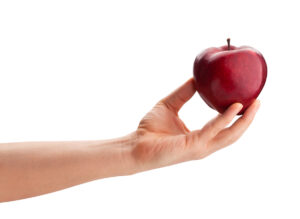It is a daily struggle. People hire trainers because they want to lose weight. Trainers teach clients correct and effective movements to complete a workout to lose weight, tone the body, or eventually gain muscle. Too many clients give up altogether because they aren’t seeing results after months and months of hard work. These same clients are often missing a large aspect of the healthy lifestyle: diet.
 Too often, many people are under the impression that in order to lose weight, they can see results after doing well in either diet or exercise. To free clients of this mindset, have them imagine diet and exercise on opposite sides of a scale. Overcompensating for one means that someone will not receive the benefits of the other. Too much diet without exercise is great, but the tone and buildup of muscle isn’t happening. On the other side, too much exercise without diet, isn’t going to achieve favorable results, either. In order to achieve a certain body style, fit into a certain piece of clothing, or to maintain a current figure, a diet must complement the exercise, not compete against it.
Too often, many people are under the impression that in order to lose weight, they can see results after doing well in either diet or exercise. To free clients of this mindset, have them imagine diet and exercise on opposite sides of a scale. Overcompensating for one means that someone will not receive the benefits of the other. Too much diet without exercise is great, but the tone and buildup of muscle isn’t happening. On the other side, too much exercise without diet, isn’t going to achieve favorable results, either. In order to achieve a certain body style, fit into a certain piece of clothing, or to maintain a current figure, a diet must complement the exercise, not compete against it.
Balance Diet & Exercise
A study by Loyola University says that physical activity has many health benefits like reduced risk of diabetes, cancer and heart disease, as well as improving mental health and overall mood. But exercise alone is not the only reason for weight loss. The mistake that many make is that they burn calories while exercising but they try to compensate for that extra burn and feel that it is acceptable to consume more calories, which is definitely not the case.
For example, clients can burn more calories when exercising by incorporating HIIT like TRUE’s Next Level Training into a workout or when increasing the incline like on the Alpine Runner. Afterwards, if they eat a healthy meal that is low in calories but full of healthy fats and carbs, as well as other nutrients, they will see better weight loss results than if they were eating unhealthily.
Cheat Days are Okay in Moderation
Above all, priorities and practicality must win over. Advise clients to exercise as often as recommended, but also maintain a manageable healthy food and beverage intake day after day. That’s not to say that rewarding with a cheat day every now and then is not okay. In fact, cheat days are recommended by many trainers to prevent a client’s fitness burn out or frustration.
Clients who are reminded to keep the end result in mind with each meal and workout will be the clients achieving their goals. Ultimately, the idea of balancing diet and exercise is not as easy as it may seem, but one is not more important than the other – both are necessary to achieve and maintain a healthy lifestyle.